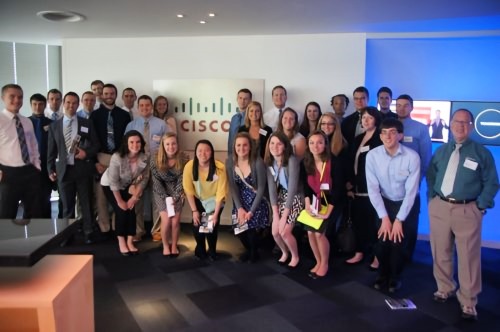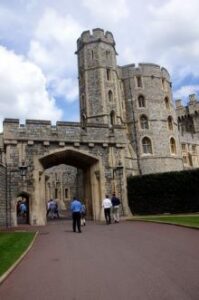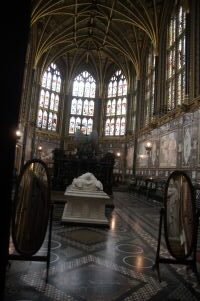Today was the kind of day—albeit cool and blustery—that makes leading a travel course a great learning and teaching opportunity. We visited two global corporations, one business, one political.
The business visit was first, set up by one of our student’s mom, who worked for Cisco, at the Cisco office near Heathrow airport in London. Cisco does $2b worth of services in the UK, its second largest market after the United States. Once known for its routers, Cisco has moved downstream,

and like other hardware companies, seeks to provide solutions through technology to companies and governments. Some of its projects—many with other vendors—are truly astonishing. One prototype they showed us was a virtual kiosk where you took a picture of yourself, picked out clothing of various colors, and tried it “on.” The next step was to put in a size chart which would “fit” you. When I mentioned I thought it would be helpful to see what a room looked like with the paint you chose before you painted it, they showed us a machine that could take a picture of your room, change the fixtures, the furniture, the flooring, color the walls, and have your parts list printed out and the parts available at whichever home improvement store wanted the system.
When I asked about academic applications, one of the technical salesmen showed us some global collaboration possibilities that could tap experts anywhere around the world. The sales marketing executive who set up the program for us pointed out that he seldom works with his UK team, but meets virtually with his “global team” around the world. As if to prove it, we had an interactive lecture with the Director of Innovation and Strategy (nice title), who was in downtown London, who explained the differences between the EU and the US, and within the EU. He told us that many of Cisco’s customers were governments, looking to become more efficient (i.e., saving money). The final speaker was in Dubai, a “refugee” from the academy to Cisco, where he is the director of the Europe/Middle East/Russia region. He spoke about being an expat—he said he left England after Oxford, and with few exceptions has spent most of his life in the Middle East.
We left Cisco impressed with the new toys/technology (at least I did, but I have the kind of cell phone parents give children as punishment for losing their Samsung or iPhones), and took the bus to the “political” headquarters of a global corporation—the British Empire—when we visited the castle at  Windsor. One of three royal estates, Windsor is the oldest, having been started by William the Conqueror after 1066. Originally of wood, it was part of the system to control and defend the important city of London. Queen Elizabeth also owns properties in London (Buckingham Palace) and an official castle in Glasgow, as well as lots of property elsewhere in the country. Because it is still occupied by the Royal family, parts of it are off limits, but the State Apartments (used mostly to entertain state guests, as requested by the prime minister) were open, as was the Chapel of St. George, the Queen’s private
Windsor. One of three royal estates, Windsor is the oldest, having been started by William the Conqueror after 1066. Originally of wood, it was part of the system to control and defend the important city of London. Queen Elizabeth also owns properties in London (Buckingham Palace) and an official castle in Glasgow, as well as lots of property elsewhere in the country. Because it is still occupied by the Royal family, parts of it are off limits, but the State Apartments (used mostly to entertain state guests, as requested by the prime minister) were open, as was the Chapel of St. George, the Queen’s private  chapel, and the resting place of recent monarchs (except for Victoria and Albert). The furnishings and paintings were appropriate for one of the world’s richest royals—lots of Rubens and van Dycks, for example, but my favorite room was the one that contained gifts. Sitting there on a shelf were two items from Tipu Sultan, the Indian sultan whose war against the British I catalogued last year when we were in Mysore and Bangalore.
chapel, and the resting place of recent monarchs (except for Victoria and Albert). The furnishings and paintings were appropriate for one of the world’s richest royals—lots of Rubens and van Dycks, for example, but my favorite room was the one that contained gifts. Sitting there on a shelf were two items from Tipu Sultan, the Indian sultan whose war against the British I catalogued last year when we were in Mysore and Bangalore.
We saw in India the Indian side of the efforts Tipu made to oust the British, even using French troops (as part of the European Wars that allowed the US to also enlist French aid for our independence). The story there was quite different, and I remember clearly a toy Tipu had made which had a tiger eating a British soldier. When Tipu was betrayed and killed by one of his officials, the British sent his crown and the gold tiger head of his throne to King George, and it is now displayed in the collections at Windsor castle. I doubt any of my students would have noticed, but for me, it sold part of a mystery I did not know was mysterious! Well worth the visit, but I daresay that the visit to Versailles, the Gold Standard of European royalty, will put Windsor to shame. Incidentally, Windsor is the last name of the current royal family—or has been since the German name given by Victoria in honor of the state Albert ruled in Germany gave way to the anti-German fervor in World War I.
We capped the evening with a visit to Porter’s English Restaurant, at the suggestion of two former students responding to my request for an “authentic” English meal. They’re both International Business graduates of IWU who came on May Term classes with me, and also studied abroad. They wanted to work overseas enough to take one year jobs or internships that got them back here, and shared some of their stories while we dined (probably not the word to use) on shepherd’s pie and variants thereof. Tomorrow, I suggested to Professor Pana, we eat real British food—at an Indian Restaurant.